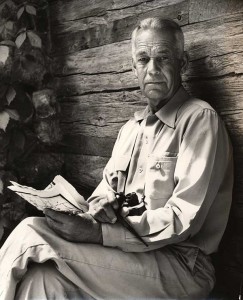 |
| Sigurd Olson (1899-1982) |
In a sense, Olson began his nascent theology in what we might call a "third place," the wilderness. In another sense, however, he actually begins with both God and humanity at the same time because for him the wilderness is a revelation of both. By wilderness, Olson meant the North Country that stretches from northern Minnesota and western Ontario to the Atlantic and northward to the Arctic. It is a land of lakes and forests, loons and wolves. Those who travel into the great silence of this vast land will discover themselves and come closer to God. Thus the discovery of God and of self are not separated into compartments or chapters but are part of one spiritual process. The human spirit and divine spirit are not to entirely separate and distinct entities. They have a unity. Olson's starting point is thus both God and us, and his holiest book of revelation is the Wilderness, not just because it reveals God through the divine creation but also because it is the place where God emerges onto the human stage in the human spirit.
For Olson, there was much at stake in preserving the wild places of our planet. When (dare we anymore say, "if"?) they are gone, we will have lost both ourselves and God. It is hard to say, "amen," to that thought.